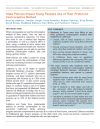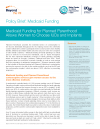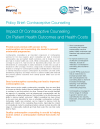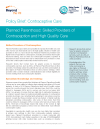Contraceptive Research with Real-World Impact
Our research helps transform contraceptive practice and policy in the United States and beyond.
We use large, randomized trials, implementation science, policy analysis to bring evidence to the forefront of clinical practice and policy change. We also connect with our community and youth advisory boards to understand the important concerns of the day and the best approaches to design solutions to strengthen reproductive autonomy. We use this guidance and evidence to develop training interventions, clinic and provider tools, and policy briefs that support contraceptive access, equity, and reproductive autonomy across a variety of local and political contexts.
Our research team includes faculty members from the Philip R. Lee Institute for Health Policy Studies (IHPS), an interdisciplinary health policy research group at UCSF dedicated to translating health research into policy and practice.
Key Highlights
We are currently conducting a large cluster randomized trial called the REACH Youth Study to enhance contraceptive access and equity among young people in the United States, including in highly restrictive policy contexts. Through this study, we aim to design and test interventions that are effective across policy contexts.
Our research on training clinics to offer their patients a broad range of contraceptive services has enhanced service delivery for patients seeking contraceptive care. Through our research, we developed and tested an intervention to increase clinics’ capacity to offer the full range of contraceptive methods. Results from the trial were a breakthrough, as it was the first successful clinic intervention in a randomized trial to reduce unintended pregnancy among family planning patients. We also ensured person-centered care and shared decision-making, essential components of contraceptive care.
After study completion, we commenced an implementation science, adapting and disseminating our replicable intervention, and now offer a broad array of comprehensive contraceptive trainings, from setting up basic services to advanced techniques and skills. We also offer in-depth training in patient-centered counseling, telemedicine services, and other emerging access modes. We continue to deliver our training to clinics throughout the US to help improve provider skills and contraceptive care nationwide, including in restrictive states. Our training program has now reached 8 million patients across the United States.
Our research on emergency contraception has significantly increased access to this important pregnancy prevention method, especially for youth with limited access to care. Data from several of our studies were reviewed by the FDA over many years, concurrent with scientific and policy debates over the impact of direct access through pharmacies to the time-sensitive medication. Evidence from our studies informed significant changes at the policy level, with levonorgestrel emergency contraception ultimately becoming available over the counter, with no age restrictions. The research has led to clinical practice and policy changes globally, with emergency contraception now available in pharmacies in most countries.
Watch: Dr. Jennifer Yarger testifies in support of expanded Medi-Cal coverage of telehealth services

In April 2024, Beyond the Pill researcher Dr. Jennifer Yarger presented testimony in support of Assembly Bill 2339, a California State Assembly bill improving telehealth access for California Medical Assistance Program (Medi-Cal) recipients.
In support of the bill, Dr. Yarger presented research findings from a recent survey among young adults revealing the barriers they face in accessing care via phone and video. She noted that despite its advantages for young people in improving privacy and access, almost 25% of those surveyed “said it would be difficult to use phone or video visits for contraceptive services.” Additionally, food and housing insecure young adults had greater difficulty using these services. Asynchronous telehealth can ensure access to care for these patients, as well as other vulnerable populations.
The bill was favorably received and passed in the Committee on Health and is currently under review in the Committee on Appropriations.
Evidence-Based Patient and Provider Tools
Our research on contraceptive counseling and care directly informs clinical practice through the evidence-based resources we create for patients, providers, and clinic staff. We distribute over 100,000 print and digital materials per year, and our materials are used by providers in all 50 states, Puerto Rico, and Canada.
- Responding to Patient Concerns About Contraception
- Protocol for the Provision of Contraceptive Services via Telehealth
- Birth Control: What's Important to You? Flip Chart
- How Well Does Birth Control Work?
- What is Emergency Contraception?
Policy Briefs
 |
Policy Brief: State Policies Impact Young People's Use of Their Preferred Contraceptive Method Many young people are not able to use their preferred contraceptive method, with cost being a primary barrier. State policies can make it easier for young people to access contraception of their choice by increasing insurance coverage and reducing cost barriers. |
 |
Policy Brief: Medicaid Funding for Planned Parenthood Allows Women to Choose IUDs and Implants Planned Parenthood provides the essential service of contraception to low-income individuals throughout the US, helping women who otherwise couldn’t afford birth control to participate in the economy and to have healthy families. |
 |
Policy Brief: Impact of Contraceptive Counseling on Patient Health Outcomes and Health Costs Contraceptive counseling is an important component of contraceptive services for two key reasons: good counseling can lead to improved contraceptive use and patient health outcomes, and in doing so, it can also help to reduce health care costs. |
 |
Policy Brief: Planned Parenthood: Skilled Providers of Contraceptive and High Quality Care Planned Parenthood providers are specialists in reproductive health care, and offer patient care that stands out for its high quality. Research shows that patients have far greater access to important contraceptive services, such as IUDs, at Planned Parenthood than at other providers. |
|
|
Policy Brief: Planned Parenthood Provides Essential Services to Reduce the High Rates of Sexually Transmitted Infections and Unintended Pregnancy in the US Planned Parenthood is a critical provider of women's health care services in the US and this rigorous research with Planned Parenthood highlights the excellent care to address the STI epidemic and reduce unintended pregnancy. |




